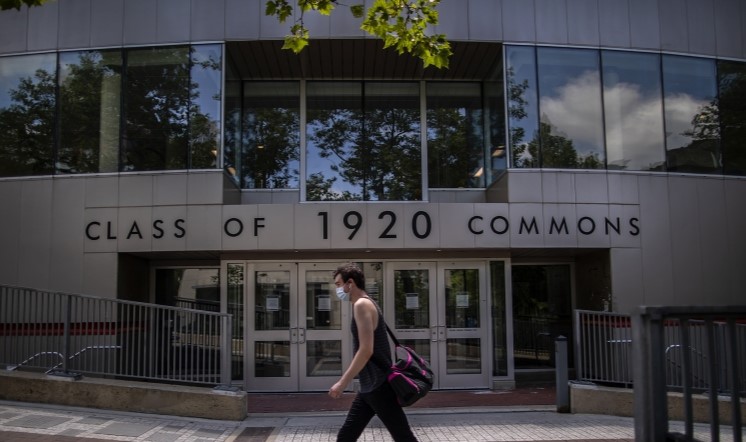Exploring Penn Dining’s “commitment to sustainability” with its outsourced food service company.

Penn Dining staff at Houston Grill, located in Houston Market, preparing meals for students during a busy lunch hour. / Photo Credit: Penn Today
By Anjali Reddy
Editor’s Note: This article is part of a series. As the second part of this series, we have already published a timeline of Penn’s dining and plan to release pieces on unions and work conditions for employees, sustainability, pricing, and the quality and health of food in the coming weeks. If you have any additional ideas about aspects of Penn Dining you would like to better understand, or if you have responses to these pieces, please email anjalire@sas.upenn.edu. Be sure to sign up for our newsletter to be the first to hear when we release the next part.
Founded in 1987, Bon Appétit Management Company (BAMCO) entered the food service industry as an onsite restaurant company with a “commitment to socially responsible practices.” Thus far, socially responsible has meant an emphasis on sustainability by sourcing produce from local farmers. Fedele Bauccio and Ernie Collins, the founders of BAMCO, began at Saga Corporation, a food service company that began after several students proposed creating a dining hall following the shutting down of Hobart College’s dining hall in 1948. Now, BAMCO operates over 1,000 cafés in 33 states with an emphasis on sustainability and farmers’ rights. Along with providing food services for several universities and colleges and museums, BAMCO also owns several restaurants, seven fine dining restaurants and six fast casual restaurants.
In 2002, The Compass Group paid BAMCO, profiting $280 million per year, $155.8 million in an acquisition deal. While BAMCO does not disclose its exact revenue, current revenue exceeds $550 million per year. The Compass Group, founded in 1941 to serve British soldiers, now operates as a food service company in 35 different countries. Beginning in 1991, The Compass Group began using acquisitions to grow their company under a strategy they called sectorization, a business approach where each of their five sectors—Business & Industry; Healthcare & Senior Living; Education; Sports & Leisure; and Defense, Offshore & Remote—appeals to distinct markets. Of these sectors, BAMCO falls under Business, Industry, and Education. As of the 2023 Annual Report, The Compass Group has 512 wholly-owned subsidiaries and 108 partially-owned subsidiaries with BAMCO listed as one of 37 principal subsidiaries. As a wholly-owned subsidiary, BAMCO does not have control over its own board of directors but has their own CEO, maintains their own management and purchasing policies and its commitment to sustainability. Under the “Who We Serve” section, The Compass Group’s website says, “The short answer is everyone.” The company reports it engages and employs over 550,000 people. Today, Compass Group prides itself on “serving more than 11 million meals and maintaining more than 1.9 billion square feet a day.”
In keeping with sustainability goals, BAMCO collaborates locally with The Common Market, a nonprofit sourcing food from over 300 local farms in the Mid Atlantic, Southeast, Texas, and Great Lakes regions, stocking Penn Dining’s small freezers with eggs, meat, and seafood. The Common Market also sources food for Lehigh University, Emory University, Johns Hopkins University, and among many others. As for food catering companies, they provide produce to Sodexo, BAMCO, Aramark, and Chartwells. This partnership with The Common Market helps Penn Dining in reaching BAMCO’s Farm to Fork standard whereby 20% of its ingredients must be sourced from farmers within a 150 mile radius. Renovations of New College House, now Gutmann College House, created Quaker Kitchen, “designed as an educational and demonstration cooking space.” Quaker Kitchen partnered with Penn Park Farm, producing over 3,000 pounds of produce a year. During the summer, the staff make and freeze soups, sauces, and dry herbs to be used for dining during the school year.
BAMCO stresses that “We work for you.” Partnering with many universities and colleges, museums, and other venues, the company makes unique recipes and menus for each partnership. According to the website, “You won’t find the same chili recipe in the same two Bon Appétit cafés. (The University of Pennsylvania has a killer vegan version!).” With the BAMCO-UPenn partnership, their website enumerates several Kitchen Principles, including seasonal menus; whole foods with fresh ingredients without trans fats or MSG; “reasonable portion sizes;” many vegetarian options; stocks, soups, salsas, salad dressings, and sauces made from scratch; muffins and cookies made fresh daily with bread made fresh when possible; and locally and socially responsibly sourced vegetables, meat, and dairy products free from artificial hormones and antibiotics. Under the Our Promise section, BAMCO and Penn Dining commit to providing healthy choices and “great-tasting, abundant meals.” Additionally “extremely unhealthy options” like “double or triple burgers, grande taco salads with fried shell, sour cream, and black olives, etc.” are not encouraged as daily specials.
Stay tuned for the next installment to learn about Penn Dining’s unions.
Anjali Reddy is a sophomore in the College studying Mathematical Economics and Computer Science from Newton, MA. Anjali is a staff writer for The Pennsylvania Post. Her email is anjalire@sas.upenn.edu.


